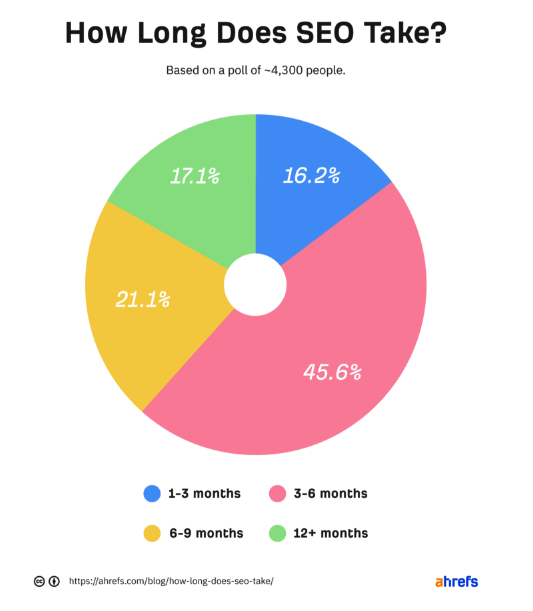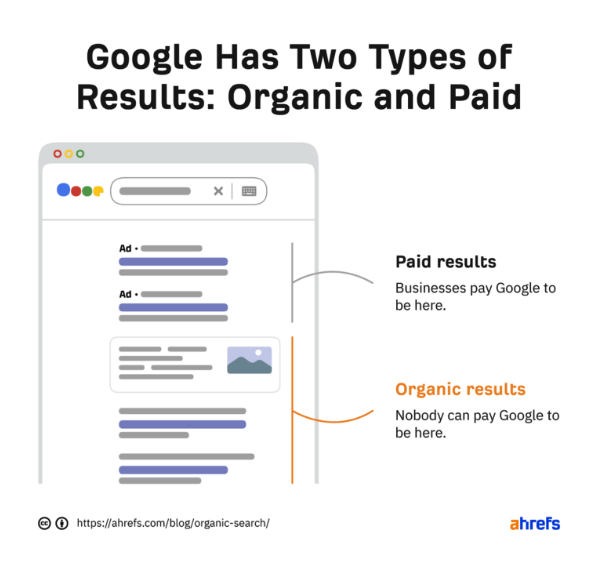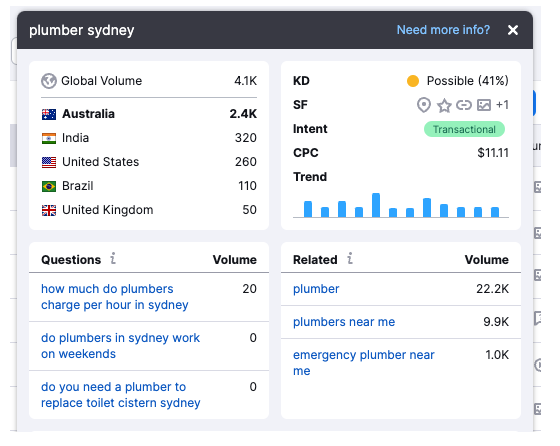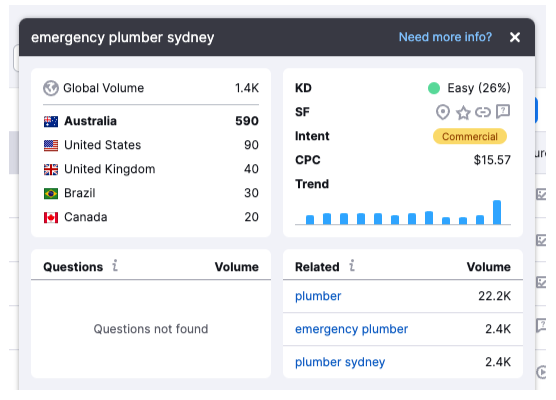
- Red Search
- Resources
- How Long SEO Takes
How Long Does SEO Take To Show Results?
-
 Daniel Law
Daniel Law
We are always asked, “how long does SEO take to show results?”
It remains a burning question for small, medium, and large Australian businesses alike. They want to know when they will notice returns on their investment, which makes perfect sense.
But SEO does not work like paid ads where data streams in upon exhausting your allocated daily or weekly budget.
Organic and sustainable SEO takes time to pay off. But how long exactly?
In this post, we’ll clear that confusion and discuss all factors affecting how long it takes to see the results of your SEO strategy.
Measuring The Right SEO Metrics = Sustainable, Real SEO Results
Before we can determine when you’ll see actionable results, we should identify your SEO success and determine the right metrics to measure.
The start of every SEO campaign includes agreeing on clear and precious SEO goals in the form of KPIs.
Here’s what we mean:
Goals:
- Definition: The outcome of what you want your business marketing strategy to achieve
- Example: To increase revenue by a given percentage or amount over the next year
KPIs:
- Definition: Metrics that will help visualise your progress towards achieving your business goals
- Example: Ongoing tracking and reporting of organic traffic, SEO rankings, leads and sales
Both are crucial measurements of success and are precise benchmarks to monitor your results. We define measurable and realistic targets and focus on how long it takes to see results throughout your core KPIs.
Moreover, no two businesses are the same, as they all have unique goals and varying KPIs that rely on different factors.
Such complexity can make SEO confusing to new businesses. One of the main reasons behind the confusion is that SEO results take time to show.
How Long Before I See SEO Results?
We now know how our success and results are defined. So let’s get into it, timeframes!
An Ahrefs poll of about 4,300 users reported that it usually takes 3-6 months before your SEO campaign shows results.

But in practice, there’s more to it than just the timeframe. Several factors influence the time it takes for results to appear, such as whether you’re an established or fresh website.
Established Websites take 3-6 months to see results
Old websites that have existed longer have relatively more backlinks, content, and existing Google rankings. So if you target low-medium competition keywords (we’ll discuss keyword difficulty below), you may notice clear results within 3-6 months.
With an aggressive SEO campaign, larger, more established websites with a strong history of SEO may even see results sooner.
New Websites take 6-12 months to see results
Newer sites that have never done SEO before should expect to see results around 6-12 months. This is because new websites have had to overcome a ‘trust’ barrier placed by Google.
It’s not uncommon to see new websites struggle to rank for competitive keywords. So if your business starts with a new domain, expect it will take longer for SEO ranking results to appear. After all, there is only a limit of 10 organic positions on Google’s search results!
Why SEO Takes Time
We briefly touched on the surface level of why SEO takes time. In the next section, let’s take a deeper dive into it.
Here’s a simple Google SERP diagram from Ahrefs:

As the infographic states, organic results happen naturally, and nobody can pay Google to secure the top spots. Additionally, Google constantly improves and updates its crawling and indexing algorithm to improve the search engine’s core functionality, to provide the most useful and relevant results for each query.
With the evolution of Google’s core algorithm, marketers can no longer abuse obsolete black hat practices such as keyword stuffing to manipulate the algorithm and rank higher on Google.
Today, such schemes will result in expensive Google penalties and manual action, which could take months or years to recover from (if ever) properly.
Moreover, the internet is bombarded with new websites going live daily. Most websites are created to rank on Google and capture valuable organic traffic.
With so many websites competing to appear on Google’s first page, Google naturally takes extra precautions to ensure that they only reward websites following their best search quality guidelines.
Following their guidelines is not enough to rank in top positions on Google. Websites must also serve the highest quality content and a flawless web experience.
We know there’s a lot to take in. And this is why SEO results take time!
SEO Metrics To Measure To Track Success
Here are a few key SEO metrics that businesses need to know:
1. Organic Traffic
Like how Google has organic results, organic traffic is search traffic that goes to your website through Google or other search engines after users input a query.
2. Impressions
Refers to how often users have seen your website’s pages in the search results. Google’s Search Console provides precise impression data and is the best source for tracking this metric.
3. Clicks
The number of times a user has clicked on your page from the search results.
4. Conversions
Conversions refer to your visitors’ actions on your page. That may include calling a phone number, filling out a form, or signing up for your mailing list or purchasing a product.
5. Domain Authority & Backlinks
Backlinks refer to links from other websites pointing to your web pages. Domains with more backlinks generally have a higher domain authority score. High domain authority domains have a better chance of ranking highly on Google for competitive keywords.
6. Number of Ranked Pages
A website consists of many web pages. To build topical authority, your SEO success could mean indexing more relevant pages in Google.
7. Number of Root Domains
Root domains are the number of websites referring to your domain through a backlink. One website can give thousands of backlinks but is only counted as a single root domain (one referring domain).
SEO Factors That Determine Success
Website History
Newer websites take more time to show results compared to aged ones. This is purely trust-related and there are no shortcuts unless you’re a reputable brand.
However, that doesn’t automatically mean aged domains may see results within 3~6 months, especially if you consider the website’s health. If the domain had previously suffered a severe Google penalty, the road to recovery might extend past 6 months.
As SEO specialists, our first course of action is understanding the website’s history. Using analytics tools allows us to assess a website’s historical SEO data and identify problematic trends and technical issues that need resolving.
If a website has lost massive SEO traffic and organic visibility over the past 2-3 years, it may indicate a technical SEO problem or severe site quality issue. When creating an SEO campaign, we’ll address these problems before focusing on growth.
In those cases, positive SEO results may take longer than 6 months.
Competition & Search Landscape
SEO doesn’t exist within a single bubble. Your competitors are investing in SEO as much as you are.
By being aware of your competition, you can get faster results with limited resources by strategically targeting highly relevant long-tail keywords that are less competitive and generate more revenue.
Look at the example below. If you’re trying to rank for the keyword “Plumber Sydney” with approx 2.4k search volume per month, achieving the top three results may take over a year of SEO effort. Semrush classifies this keyword with a 41/100 difficulty score.

An example of a much lower competition keyword that may work better to drive revenue is “Emergency Plumber Sydney”.

Unlike “Plumber Sydney”, “Emergency Plumber Sydney”, has relatively lower competition, rated at 26% keyword difficulty score. Alternatively, considering that ‘near me’ searches now equate up to 84% of all mobile searches on Google, maybe ‘Plumber Near Me’ may also be considered as a highly lucractive keyword to target.
The above scenario is very basic, and there are countless ways in which we can tailor an SEO campaign to suit your goals. We recommend speaking with our SEO specialists to learn more about how we can best serve your needs.
Allocated SEO Budget
SEO is possible and doable on a budget. But the more resources you can invest in your SEO campaign, the faster and better your results will be.
For instance, new websites can hire content specialists to create high-quality content. But that will leave the technical backend in your hands. You can further invest in SEO tools to make the work efficient, but at this point, you can save more by hiring an SEO agency to do all the work for you.
That includes competitor analysis, content creation, content optimisation, link building, technical auditing and ongoing reporting.
Resources You Can Commit to Your SEO Agency
Your budget will determine the scope of your SEO services. But the time you allocate towards SEO defines how fast you’ll achieve results.
While you cannot control your site history, health, and competition, you can control the time and resources you commit to your SEO project.
For instance, say two businesses compete for the same competitive keywords. Both businesses know that technical SEO, content, and backlinks are three silos of SEO success.
They are partnered with an SEO agency but are allocated varying resources to discuss goals, approve content and provide additional technical info.
If business A is engaged with their SEO partner six days a month and business B only engages for two days monthly, we should expect business A to see faster SEO results.
We recommend organising a backlog of tasks and SEO concerns at the beginning of your campaign and building your strategy around available resources. By having a clear headroom for your help, you can focus on nailing opportunities that fit your time and budget and focus on other goals as you move further.
We’re not saying that you need to perform additional work, but it is important that, as a business, you are entirely engaged with your SEO progress. Let’s kick goals together!
Strategy Execution
Half the battle is won with careful planning. The rest of it is up to how the SEO strategy is executed.
Besides, the only way to get your ROI and earn actionable results is by getting things done.
Consider whether or not you’re working with an SEO agency with a proven history of producing sustainable results through precise SEO strategy execution.
That means you need to know if your SEO partner is up to the task and can realise your strategy and report back to you every step of the way. Fluid SEO execution means faster and better results.
SEO Takes Time, But its Rewards are Endless
An SEO campaign involves ongoing hard work. But looking at it as a long-term growth journey helps reframe the investment and puts it in perspective.
A well-executed SEO campaign will put your brand on a level-playing field with top brands and significantly drive a sustainable and predictable revenue stream.
Speak with our SEO Sydney specialists today, and let’s chat about how we can help grow your business.
Written by





